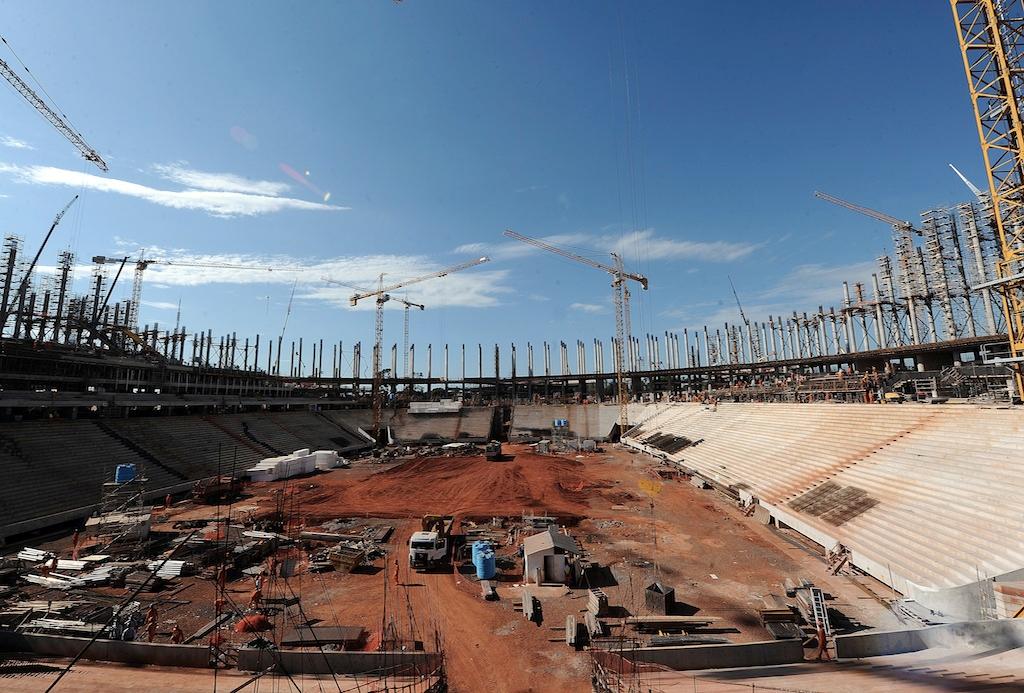Committee condemns rights violations in mega-event preparation
View of the National Stadium works in Brasilia on February 9, 2012. The National Stadium is under construction for the FIFA World Cup Brazil 2014.
Yesterday, the Rio de Janeiro-based People's Olympics & World Cup Committee released their collaborative dossier, "Mega-events and Human Rights Violations in Rio de Janeiro," the first formal denouncement of the city's infrastructural build-up to the 2014 FIFA World Cup and the 2016 Summer Olympics.
The 90-page document [PDF] and accompanying DVD, distributed at the official launch event last night, problematizes various aspects of the city's build-up strategy and implementation.
The dossier seeks to bring a series of interconnected and infrastructural rights violations to the national and international community's attention, "to reveal the true trajectory of the Olympic project in Rio de Janeiro: an even more unequal city, which will exclude thousands of families and destroy entire communities…a project that will appropriate the majority of benefits for a select few economic and social agents."
Notably, the dossier includes the results of an investigation into homeowner and resident violations throughout the city, estimating that a total of 7,185 families have been or will be unjustly displaced in mega-event preparations.
In an attempt to quantify homeowner rights violations, the People's Committee partnered with the Brazilian Platform of Economic, Social, Cultural and Environmental Human Rights (Dhesca), a Rio-based organization, to provide accounts of all communities being impacted or removed for mega-event related infrastructure.
Among them is Morro de Providência, a 110-year-old hilltop neighborhood largely recognized as the city's first favela, originally founded by freed slaves. In a recently announced government project, the hilltop neighborhood will be transformed into a locale for "touristic activity and historic preservation," replete with chairlift access to the favela's "enviable" hilltop view.
The dossier argues that the project, like many others, has been marked by a serious lack of transparency and community consent; the only information provided to Morro de Providência's residents is the information that over 835 families will be "relocated" outside of the favela.
Other documented infringements include relocation of favela residents to environmentally risky areas; a systematic lack of information regarding de-appropriation; disregard of due juridical process at the municipal level regarding proprietary public space; and documented instances of “violence and terrorism against those seeking justice.”
In a pre-launch debate hosted at the Federal University of Rio de Janeiro, panelist and Congressman Marcelo Freixo denounced the myriad relocation projects. "There is an absolutely absurd lack of democracy and transparency…marked by authoritarian power, violence…a criminalization of the city's poorest, and their systematic exclusion as citizens," he said. "It's bigger than the World Cup and the Olympics.”
The dossier also problematizes the city's recently introduced "My House, My Life" project, which transfers residents of centrally located favelas to government-built projects on the city's outskirts. The areas to which residents are being located, the dossier claims, "provides almost no overage of public services or urban infrastructure…especially educational opportunities."
According to Clara Silveira, moderator of Monday’s pre-launch debate and member of the National Movement for Residents’ Rights, "Popular participation is inexistent regarding these new projects … which are completely unintegrated into the city's larger urban plan."
The Committee also expressed concern about the environmental effects of such mega-events on Rio, a city already plagued with flooding, mudslides, lack of basic sanitation and major infrastructural issues.
Additional topics include the longstanding effects of the city’s polemic pacification project, whose first 18 communities fell within Olympic areas, as well as the financial blowback from the influx of multinational corporate funding.
The dossier also argues that the World Cup will also bring an “elitification” of soccer, one of its most important cultural staples: “Historic stadiums are being destroyed to be rebuilt as malls. Tickets for national and state-level championships have become too expensive for the ‘traditional’ fan.”
"Since the moment in which Rio de Janeiro was chosen as the site of the 2016 Olympics, big business, politicians and various analysts have reinforced that the event will bring investment opportunities to the city, allowing it to deal with its greatest problems…as a way to bring dignity to the population," the dossier claims. "However, we can … now clearly affirm that the city is advancing in a way that directly opposes social integration and the promotion of human dignity."
